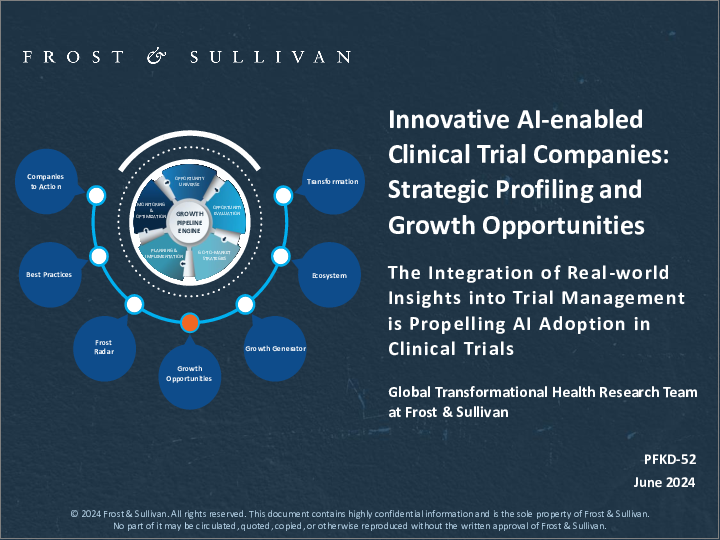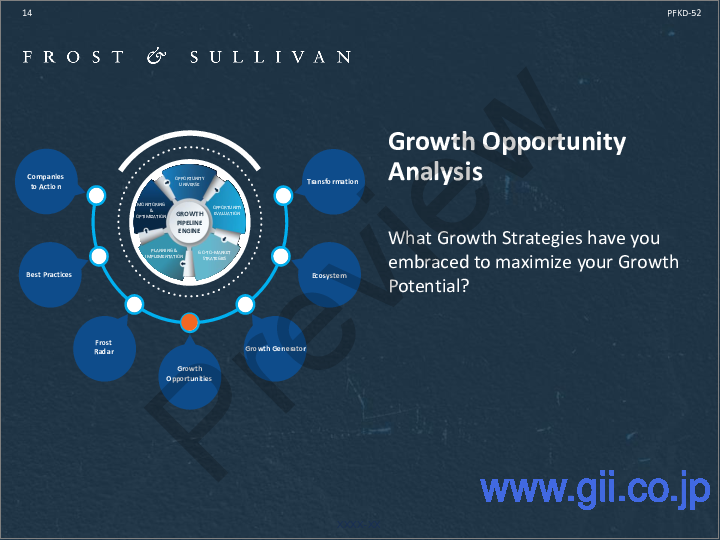|
|
市場調査レポート
商品コード
1513545
AIを活用した革新的な臨床試験企業:戦略的プロファイリングと成長機会Innovative AI-enabled Clinical Trial Companies: Strategic Profiling and Growth Opportunities |
||||||
|
|||||||
| AIを活用した革新的な臨床試験企業:戦略的プロファイリングと成長機会 |
|
出版日: 2024年06月12日
発行: Frost & Sullivan
ページ情報: 英文 60 Pages
納期: 即日から翌営業日
|
全表示
- 概要
- 目次
臨床試験管理へのリアルワールドインサイトの統合により、臨床試験におけるAIの採用が促進
世界中の臨床パイプラインで複雑な新規治療が急増する中、計画・実行のためのテクノロジーを活用したソリューションによる適応型試験デザインを通じて、試験デザインを改善する傾向が一般的になっています。人工知能(AI)は、分散型の試験デザインをサポートし、患者中心の臨床試験方式を可能にするという点で、大きな認知度を獲得しています。臨床試験は、電子カルテ(EMR)の形で大規模な長期患者データベースに依存しています。堅牢なデータベースが利用可能であるにもかかわらず、そのほとんどは明確さと構造に欠けており、読みにくいものになっています。その結果、AI/機械学習(ML)アルゴリズムとプラットフォームの急速な普及により、非構造化データベースを簡単に構造化できるようになり、電子カルテ(EHR)の利用は、世界中の臨床試験の状況を改善する大きな可能性を秘めた、膨大で豊富かつ関連性の高いデータソースとなっています。
臨床試験デザイン、施設の選定、患者の特定と維持に統合されたAI主導のソリューションを取り入れることで、様々なCROや製薬企業の市場参入戦略が容易になります。AIは臨床試験において、コスト削減、効率化、遠隔地からの患者募集・管理・関与による分散型試験への移行をサポートする重要性を増しています。音声認識、チャットボット、その他のデバイスの形でのインタラクティブプラットフォームは、患者のアドヒアランスを向上させ、より多くの患者を確保します。これらのプラットフォームは、適切な治験責任医師や治験施設の選定にも非常に有益です。RCTは、AIの応用が拡大しているもう一つの重要な分野であり、スポンサーはこのテクノロジーを活用することで、生成された膨大な施設レベルのデータセットを分析し、試験デザインと実施の可視性を高めることができます。
Icon plc、Novotech、Syneos Health、IQVIAなどの大手CROや、BMSなどのいくつかの製薬企業は、AIベースのプラットフォームを導入し、施設の選定や患者の募集をサポートしています。BMS、Amgen、 AstraZeneca、Novartisなど、他の多くの企業も、臨床試験でAIを適用し、臨床試験全体のタイムラインを短縮する目的で、さまざまな段階の最適化を可能にしています。
AIは、RWDの収集と分析、臨床試験の第I相と第II相のシームレスな組み合わせ、患者中心の新規エンドポイントの開発など、臨床試験を変革するための基本的なイノベーションをもたらします。AIは、さまざまな入力から標準化され、構造化されたデジタルデータ要素を作成するためにも活用できます。AIを活用した試験デザインは、患者中心のデザイン作成を最適化・加速化するため、患者の負担を大幅に軽減し、成功の可能性を高め、修正回数を減らし、試験の全体的な効率を向上させます。大手テクノロジープロバイダーと製薬のスタートアップ企業が協力することで、将来的にはより効果的な臨床試験の舞台が整いつつあります。
目次
戦略的インペラティブ
- なぜ成長が難しくなっているのか?
- The Strategic Imperative 8(TM)
- AIを活用した臨床試験業界に対する主要な戦略的インペラティブの影響
- Growth Pipeline Engine(TM)を促進する成長機会
エコシステム
- 分析範囲
- セグメンテーション
- 医薬品開発ベンダーエコシステム
- AIベンダーエコシステム
- 臨床試験におけるAI活用の価値提案
- 独自の価値提案に基づく戦略的プロファイル
成長機会分析
- 成長促進要因
- 成長抑制要因
- 規制シナリオ:臨床試験におけるAIの使用
- ConcertAI:企業概要
- ConcertAI:価値提案
- ConcertAI:成長戦略
- Unlearn:企業概要
- Unlearn:価値提案
- Unlearn:成長戦略
- Phesi:企業概要
- Phesi:価値提案
- Phesi:成長戦略
- QuantHealth:企業概要
- QuantHealth:価値提案
- QuantHealth:成長戦略
- Owkin:企業概要
- Owkin:価値提案
- Owkin:成長戦略
- Deep 6 AI:企業概要
- Deep 6 AI:価値提案
- Deep 6 AI:成長戦略
- Paradigm:企業概要
- Paradigm:価値提案
- Paradigm:成長戦略
- Mendel Health:企業概要
- Mendel Health:価値提案
- Mendel Health:成長戦略
- Oncoshot:企業概要
- Oncoshot:価値提案
- Oncoshot:成長戦略
- Amazon Web Services, Inc.
- AWS:価値提案
- AWS:成長戦略
成長機会ユニバース
- 成長機会1:連合データシステムによるデータの相互運用性
- 成長機会2:患者識別・登録向けLLMによるデータの再構築と配信
- 成長機会3:RWD/RWEベースのオンコロジー試験デザインとプロトコルの最適化
- 資料リスト
- 免責事項
The Integration of Real-world Insights into Trial Management is Propelling AI Adoption in Clinical Trials
As global clinical pipelines witness a surge in complex novel therapies, there is a general inclination toward improving trial design through adaptive trial designs with technology-enabled solutions for planning and execution. Artificial intelligence (AI) is gaining large-scale recognition in terms of supporting decentralized trial designs and allowing patient-centric clinical trial modalities. Clinical trials rely on large-scale longitudinal patient databases in the form of electronic medical records (EMRs). Despite the availability of robust databases, most lack clarity and structure, making them difficult to read. As a result, the rapid adoption of AI/machine learning (ML) algorithms and platforms allows easy structuring of unstructured databases, and the use of electronic health records (EHRs) represents a vast, rich, and highly relevant data source that holds tremendous potential to improve the global clinical trial landscape.
Incorporating integrated AI-driven solutions in clinical trial design, site selection, and patient identification and retention will ease the go-to-market strategy for various CROs and pharmaceutical companies. AI is gaining significance in clinical trials to reduce cost, increase efficiency, and support the transition to decentralized trials through remote patient recruitment, management, and engagement. Interactive platforms in the form of voice recognition, chatbots, and other devices ensure better patient adherence and greater retention. These platforms are also highly beneficial in the selection of appropriate investigators and trial sites. Randomized control trials (RCTs) represent another important area seeing increased AI application, where sponsors can leverage the technology to analyze the vast site-level datasets generated for greater visibility into trial design and implementation.
Leading CROs, such as Icon plc, Novotech, Syneos Health, and IQVIA, as well as several pharmaceutical companies, including BMS, have successfully deployed AI-based platforms to support site selection and patient recruitment. BMS, Amgen, AstraZeneca, and Novartis, among several other companies, are also applying AI in clinical trials to enable the optimization of different stages, with the intent of reducing overall trial timelines.
AI brings innovation fundamental to transform clinical trials, such as collecting and analyzing RWD, seamlessly combining phase I and II of clinical trials, and developing novel patient-centric endpoints. AI can also be leveraged to create standardized, structured, and digital data elements from a range of inputs. As AI-enabled study design helps optimize and accelerate the creation of patient-centric designs, it significantly reduces patient burden, increases the likelihood of success, decreases the number of amendments, and improves the overall efficiency of trials. Together, large technology providers and pharmaceutical start-ups are setting the stage for more effective clinical trials in the future.
Table of Contents
Strategic Imperatives
- Why Is It Increasingly Difficult to Grow?
- The Strategic Imperative 8™
- The Impact of the Top 3 Strategic Imperatives on the AI-enabled Clinical Trials Industry
- Growth Opportunities Fuel the Growth Pipeline Engine™
Ecosystem
- Scope of Analysis
- Segmentation
- Drug Development Vendor Ecosystem
- AI Vendor Ecosystem
- Value Proposition of Using AI in Clinical Trials
- Strategic Profiles Based on Unique Value Proposition
Growth Opportunity Analysis
- Growth Drivers
- Growth Restraints
- Regulatory Scenario: AI Use in Clinical Trials
- ConcertAI: Company Overview
- ConcertAI: Value Proposition
- ConcertAI: Growth Strategy
- Unlearn: Company Overview
- Unlearn: Value Proposition
- Unlearn: Growth Strategy
- Phesi: Company Overview
- Phesi: Value Proposition
- Phesi: Growth Strategy
- QuantHealth: Company Overview
- QuantHealth: Value Proposition
- QuantHealth: Growth Strategy
- Owkin: Company Overview
- Owkin: Value Proposition
- Owkin: Growth Strategy
- Deep 6 AI: Company Overview
- Deep 6 AI: Value Proposition
- Deep 6 AI: Growth Strategy
- Paradigm: Company Overview
- Paradigm: Value Proposition
- Paradigm: Growth Strategy
- Mendel Health: Company Overview
- Mendel Health: Value Proposition
- Mendel Health: Growth Strategy
- Oncoshot: Company Overview
- Oncoshot: Value Proposition
- Oncoshot: Growth Strategy
- Amazon Web Services, Inc.
- AWS: Value Proposition
- AWS: Growth Strategy
Growth Opportunity Universe
- Growth Opportunity 1: Data Interoperability with Federated Data Systems
- Growth Opportunity 2: Data Restructuring and Distribution with LLMs for Patient Identification and Enrollment
- Growth Opportunity 3: RWD/RWE-based Oncology Trial Design and Protocol Optimization
- List of Exhibits
- Legal Disclaimer






